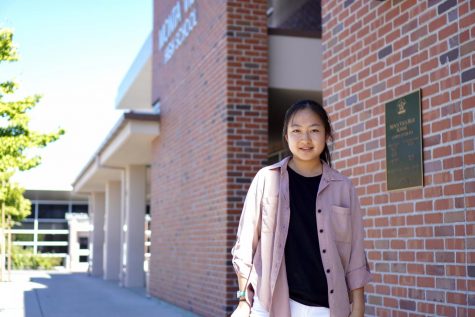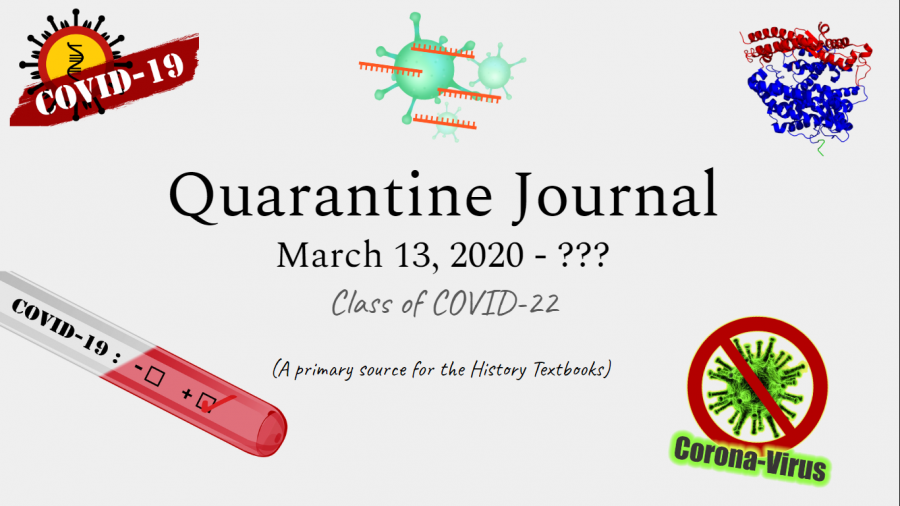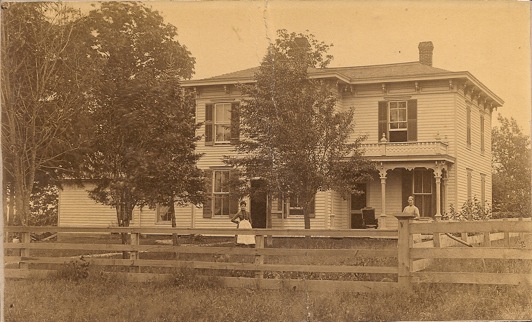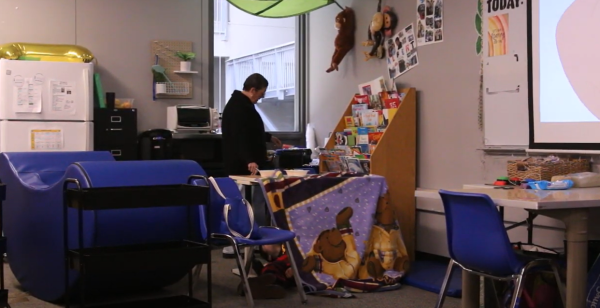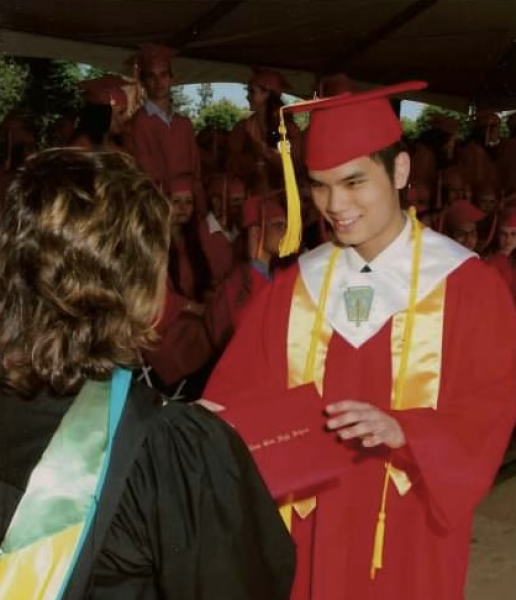English teacher Mark Carpenter opens a Curious Cat account
Investigating one teacher’s approach to connecting with students during the shelter-in-place order
Photo used with permission of Nica Tofighbakhsh and Mark Carpenter
Sophomore Nica Tofighbakhsh, English teacher Mark Carpenter, and junior Fiona Luo give insight to the Curious Cat account.
The day before Principal Ben Clautznitzer announced that school would be closed for the next few weeks until April 3rd as of now, literature teacher Mark Carpenter created an account on an anonymous Q&A social network tool, Curious Cat, and shared it with his World Core and Honors American Literature (HAmLit) students, allowing them to ask him questions on topics ranging from philosophy to jokes.
Seeing that MVHS might close, Carpenter was concerned that, in the event of a school closure, many students would not be able to reach out to teachers and adults on campus. While scrolling through Twitter, he discovered Curious Cat. As a means to prevent his students from experiencing further social isolation and to make it easier for students to talk to him, he decided to create an account under the username “ask_reason”.

Q: I reaaaaaaaaaaallyyy wanna cut ur fine hair
A: It’s really important to me to see what happens when I don’t cut my hair.
“I thought, ‘Let me do something to try to maintain and/or build connections [with students],’” Carpenter said. “‘Let me do something to let my students communicate with each other in a way that’s very low risk for them — because it’s anonymous.’ I thought, ‘Hey, this could be a terrible idea, it could be a great idea. But, we’re in unprecedented times. We’re all trying new things, so I’m going to try [Curious Cat] and hope for the best.’”
Since classes have been canceled, Carpenter often responds to a few of his students’ questions each day — some are serious questions, some are just for fun. He hopes that this network can be a tool for students to talk about subjects not limited to school or current events.

Q: did you know you have very nice-looking teeth? they look like advertisement-grade teeth A: I want my teeth on a billboard over some lonely valley of ashes.
“I hope it gives a non-academic source of distraction. Through these questions we’re generating, people are talking about video games, talking about books, talking about movies,” Carpenter said. “We’re generating things to do, to distract ourselves, to keep ourselves busy and occupied, to keep ourselves off of the news.”
When junior and HAmLit student Fiona Luo heard about her teacher’s Curious Cat account, she thought it would be a great opportunity for students to connect with Carpenter. Because some students tend to be too shy to speak to Carpenter in person, Luo believes that asking questions anonymously and digitally is a more casual and comfortable way for introverted students to bond with him. In addition, she believes this can be good practice for improving communication skills related to literature class.
“Amidst social distancing, [Curious Cat] is like social closening [where students get closer],” Luo said. “Unlike other subjects, language arts is heavily discussion-based. I think a key component of literature education is learning to express your ideas and communicate with people. That includes communication with Mr. Carpenter. I think that the Curious Cat account is very useful and help[s] kids practice their communication, discussion and question-asking skills, which is very important to literature as a whole.”

A curious student asks a curious question on Curious Cat
Like Luo, Carpenter also states that Curious Cat is a great opportunity for students to enhance their literature capabilities. He believes that this account is a more comfortable environment for students to challenge his ideas and beliefs more often.
“I think sometimes students are a little more prone to appear to agree with me in the classroom when they recognize, ‘I don’t want to make this guy too mad when he’s grading my essays,’” Carpenter said. “But in a place where it can be anonymous, I do hope that students are feeling more comfortable challenging both myself and themselves.”
With a different perspective, sophomore Nica Tofighbakhsh feels that talking to Carpenter through Curious Cat is similar to having a conversation with a close friend.
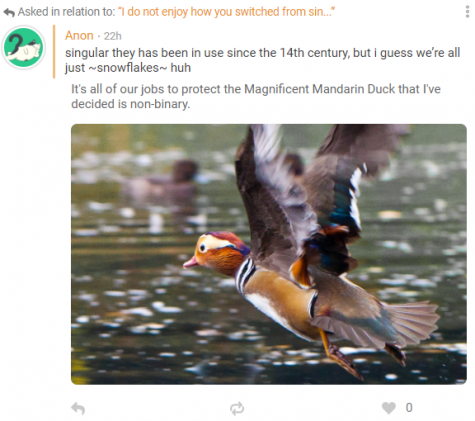
Q: singular they has been in use since the 14th century, but i guess we’re all just ~snowflakes~ huh
A: It’s all of our jobs to protect the Magnificent Mandarin Duck that I’ve decided is non-binary.
“[His responses are] really friendly and just fun,” Tofighbakhsh said. “It’s not the same formality that you usually have with your teachers. It’s very casual. It’s nice to be able to have some fun with your teachers in a friendly and open way, and to be able to get off that stress.”
Carpenter understands that the casual nature of Curious Cat lowers students’ risk of asking a question, which helps explain the variety of unique questions he’s received on the platform. For example, he received questions such as five things he would do to improve the school system or what his K-pop preferences were.
“I get students outside of class who [ask] me really interesting questions that have nothing to do with what we’re learning,” Carpenter said. “And those are my favorite interactions, a lot of the time. [Curious Cat] just gets people over a little bit of that anxiety of, ‘I’ve wanted to say this, but I haven’t wanted my name and face attached to my saying this.’”
Inspired by his Curious Cat account, Tofighbakhsh and all of Carpenter’s World Core students decided to create a quarantine journal on Google Slides to send to Carpenter through Curious Cat. The journal documents the students’ journey through social distancing by including pictures of group facetime conversations on Zoom, quarantine memes and screenshots of emails sent to teachers.
View Quarantine Journal Slides
Once Carpenter viewed the journal after a student sent it to him, he was touched by the sweet messages that each student put on the slides.
“I’m glad my students are staying in touch, sharing with each other, being in each others’ faces, if only virtually,” Carpenter said.

Question: thoughts on the blobfish?
Response: I often feel that I look like one in photographs.
While asking and reading the conversations on Curious Cat, Tofighbakhsh and Luo both note that some of Carpenter’s responses contain humorous comments and answers to certain questions. To Luo, the humor expressed in some of Carpenter’s responses gives students more confidence in posing questions while also offering them entertainment.
“It’s a common base for kids to continue asking Mr. Carpenter questions even if it’s not about the coronavirus,” said Luo. “It shows that there’s someone looking out for us and caring.”
Similar to Luo, Tofighbakhsh and Carpenter believe that humor helps provide entertainment and laughter to students while also decreasing the boredom they have at home.
“I mean, [there’s] the cliche of laughter being the best medicine,” Carpenter said. “But I think laughing together connects people. People love to be an audience. For a stand-up comedian, people love to sit on their couch together and watch their favorite sitcom. People like to laugh together and I hope I’m giving my students a chance to laugh together even if they’re not together.”
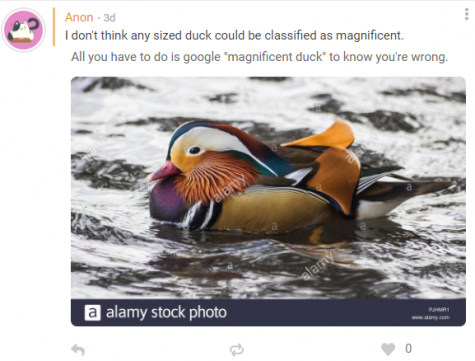
Overall, Luo feels that Carpenter’s Curious Cat account has made her time during lockdown more enjoyable. She points out that her favorite response on the account was about standardized testing.
“I think [Curious Cat] has helped cheer me up in these tumultuous times,” Luo said. “Sometimes when I’m feeling alone, or scared about the coronavirus, I know that I can check the Curious Cat account and see all of these witty posts from Mr. Carpenter.”
Through Curious Cat, Carpenter has also been able to reflect on his own life and values, since students often ask about his personal experiences and for advice on certain problems pertaining to their lives.
“If I want students to let down their barriers, I’ve got to let down my barriers,” Carpenter said. “If I want students to treat me like a human being, I need to show them I’m a human being.”
Carpenter believes that in the time of the coronavirus, it is crucial to maintain connections because social isolation can be more dangerous that some may expect.
“We get on each other’s nerves, we get tired of the day-to-day grind of going to school, and all of that,” Carpenter said. “But, we also rely on those things and having them pulled out from under us can be very disorienting. So being able to communicate with other people, doing things for HAmLit — we’re setting up regular zoom calls for our class sessions so that students could see each other’s faces — just seeing people who aren’t your immediate family that you might be spending a little bit more time than you want in close quarters with is important.”
View some of Carpenter’s Curious Cat Responses
Click here to view Carpenter’s Curious Cat account and ask him a question.
